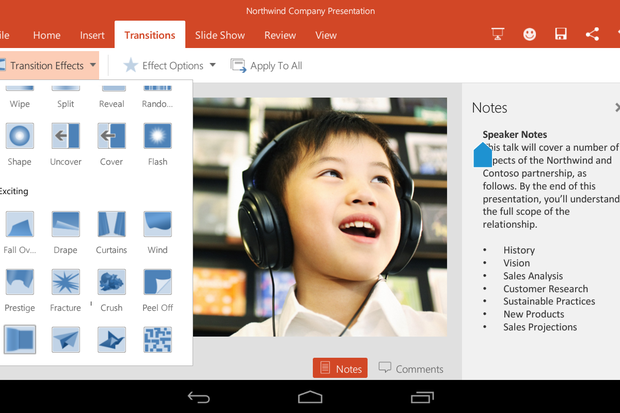Microsoft pursues Android users, preloading Office on Samsung, Dell tablets
Microsoft pursues Android users, preloading Office on Samsung, Dell tablets

The company’s eager to extend its services beyond Windows, but some users may see this freebie as bloatware
If it can’t sell customers on Windows, Microsoft’s Plan B has been to bring its services to other platforms. Today, it did just that, announcing deals with 11 Android tablet makers to preload Excel, Word, PowerPoint, OneNote, OneDrive, and Skype onto some of their tablets. Dell and Samsung are among the device makers whose tablets will have the preinstalled Office software.
mobile smartphone hands user
Mobile security: iOS vs. Android vs. BlackBerry vs. Windows Phone
Google’s Android for Work promises serious security, but how does it stack up against Apple’s iOS and
READ NOW
In addition, Samsung will preload OneNote, OneDrive, and Skype on the forthcoming Galaxy S6 and S6 Edge smartphones; Microsoft does not currently offer Word, Excel, or PowerPoint for Android smartphones.
Samsung has also agreed to sell enterprise-level Office 365 subscriptions to customers of its enterprise-level Knox security service. Businesses that purchase devices through Samsung’s business-to-business sales channels will have access to three versions of Office 365 — Business, Business Premium, and Enterprise — coupled with Samsung’s Knox security solution, Microsoft said. The bundle also includes a setup and support service from Samsung.
Why this matters: Most people will see Microsoft’s Office suite as a useful addition to an Android tablet. A one-year trial of Office 365 materially contributes to the value of the device (though we’re not sure whether Samsung and Dell will offer it). The flipside, however, is that Android users, long used to living without Office, may see its sudden appearance as bloatware, even if they can uninstall it.
Microsoft Office everywhere
A little over a year ago, Satya Nadella took the CEO chair at Microsoft promising a “mobile first, cloud first” mission that would use software to tie devices together. Over time, Nadella has made clear that those devices don’t necessarily need to be powered by a Microsoft operating system.
“For OEMs, these deals will increase the value of and enrich people’s experiences on Android devices,” Peggy Johnson, the executive vice president of business development for Microsoft, wrote in a blog post. According to Johnson, Microsoft is following its users, “addressing consumer demand for top services by making them already available on a device, instead of requiring consumers to download them separately.”
But while Samsung was the biggest name to sign up for Microsoft’s Office 365, it was not the only one. Microsoft signed similar deals with ten other hardware partners, including Dell in the United States, to install the Office apps on other Android tablets. (The list includes a number of regional hardware makers you’ve probably never heard of, including Russia’s DEXP, as well as a global “white box” maker Pegatron, which builds hardware for other companies.)
All will pre-install Word, Excel, PowerPoint, OneNote, OneDrive, and Skype on Android tablets coming to market later this year, Microsoft said. Dell said it would use Google’s Android for Work to secure corporate information, and presumably that means the other hardware makers will, too.
So, is this bloatware?
Following the Superfish debacle at Lenovo, PCWorld dug into the software preloaded on many retail PCs, determining the worst PC makers for shipping bloatware. By preloading Office, some will undoubtedly say that Microsoft, Dell, Samsung, and the other hardware makers are doing exactly the same thing.
Fortunately, Microsoft says that you will be able to uninstall the preinstalled Office apps, making them, at worst, an annoyance. “Yes, customers may delete the pre-installed apps if they would like,” Microsoft said in a statement. “However, we’ve seen overwhelmingly positive feedback from customers as we’ve brought Office apps to all platforms. Over a billion people around the world use Office and they want a seamless experience across devices and platforms.”
Additional reporting by InfoWorld Executive Editor Galen Gruman.
